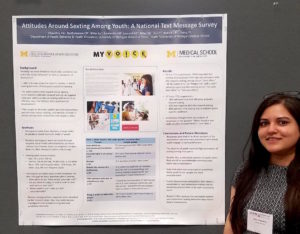Kiren, adolescent health researcher and MyVoice member, presented data on sexting at the Society for Adolescent Health and Medicine conference in Washington D.C.
The New York Times ran a headline in March 2018 “Teenagers Are Sexting — Now What?” with practical advice from health care providers to parents. Meanwhile, nearly half of U.S. states (23 currently) have laws that define sexting between minors to be child pornography. American Bar Association noted recent cases from across the country of minors strapped with adult felony charges in sexting cases. In schools, parents, teachers and schools boards are debating if and how to integrate sexting into sex ed curriculums.
Doctors, parents, legislators, teachers, and journalists are discussing and defining sexting and youth digital sexual behavior. MyVoice wanted to know what youth really think about the issue.
Leading research in the area is Kiren, a MyVoice member and interventionist for the Child Health and Wellbeing Lab at the University of Michigan. Kiren recently shared findings on sexting at the Society for Adolescent Health and Medicine annual conference in Washington D.C.
MyVoice surveyed youth, age 14-24, asking the following open-ended text messages:
•How often do you think people your age sext?
•Do you think it’s okay to send a nude or semi nude picture over text?
•When would a sext make you feel uncomfortable?
Of our 772 respondents, 95% reported that sexting among people their age was prevalent with the majority stating sexting occurs “very often,” “all the damn time,” or “frequently” with a small minority reporting that sexting occurs “not sure how often” or “not very often.”
Of these 772 respondents, 18% indicated they had affirming attitudes toward sexting, 42% had negative attitudes toward sexting, and 40% believed that sexting was acceptable given specific conditions.
Six themes emerged from the team’s analysis of responses to the question, When would a sext make you feel uncomfortable?
| THEME | SAMPLE QUOTE |
| Sexts which are nonconsensual / unsolicited n= 154 | “If I had expressed that I didn’t want them sent to me” |
| Uncomfortable in all context n=77 | “If it came from anyone, whether i knew them or not” |
| Stranger n=54 | “If it was from someone I don’t know” |
| Outside the context of a relationship n=47 | “If it is from my boyfriend, no. Someone else? Yes. Sex is a personal thing, and sending someone something like that unasked for is sexual harassment” |
| From someone who was an acquaintance only n=47 | “I would feel uncomfortable if I didn’t ask for one or if I had a platonic relationship with that person. I would feel this way because I have no reason to ever want to see it” |
| Being in public or with other people n=24 | “If I’m out in public I don’t want to have to worry about that.” |
Check out the full version of Kiren’s conference poster.

